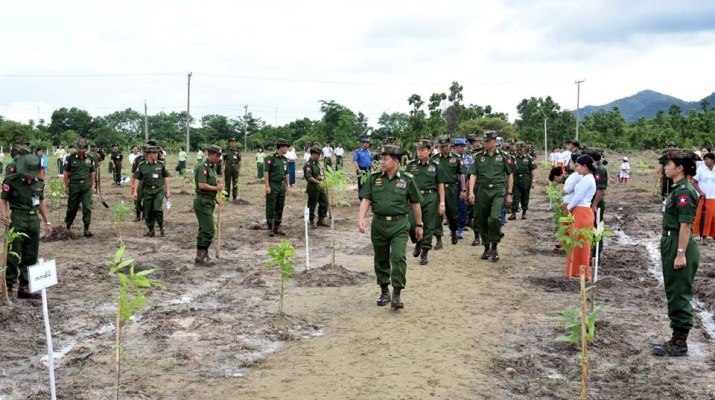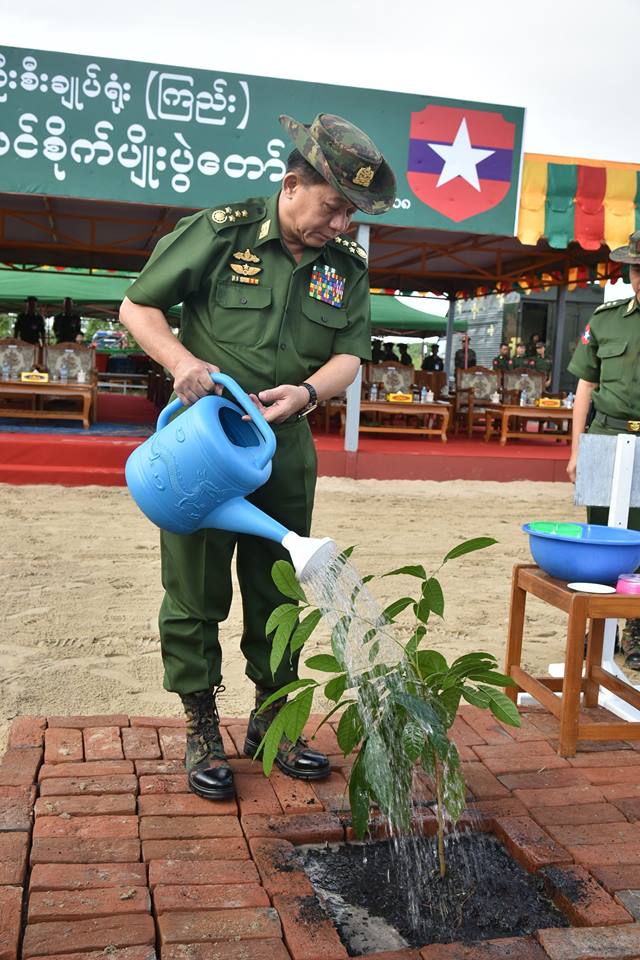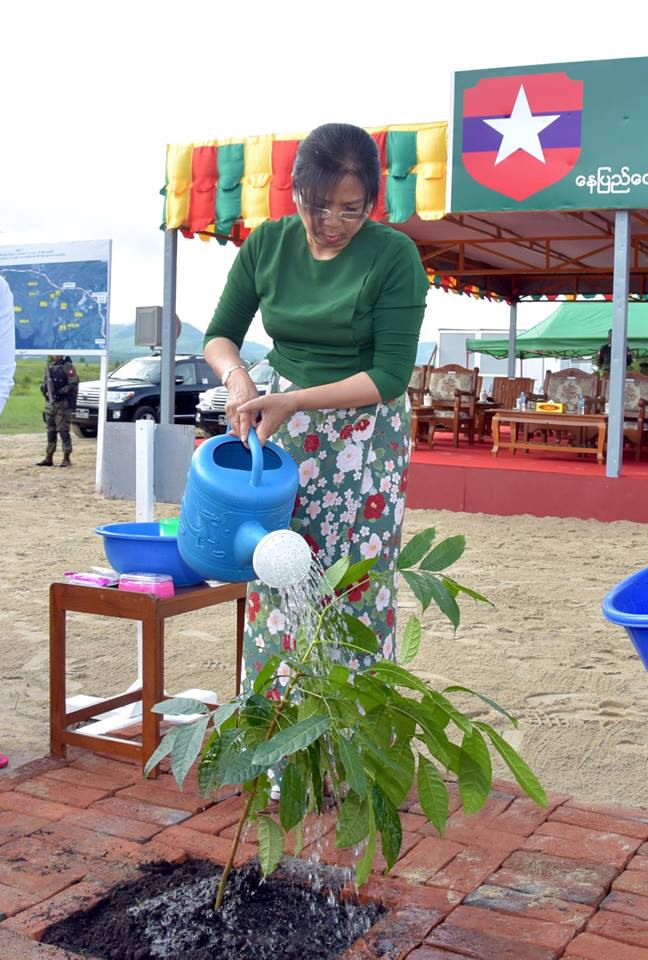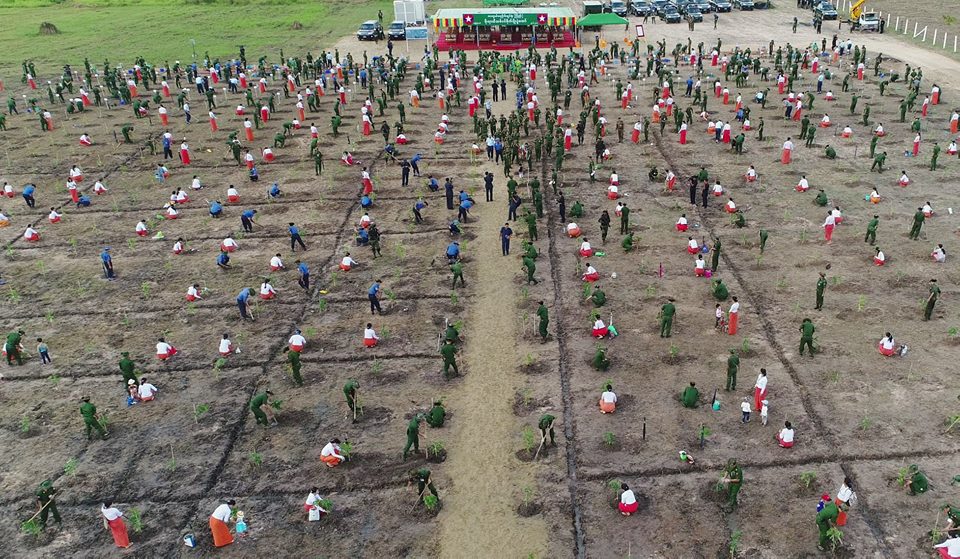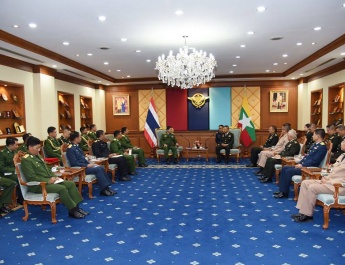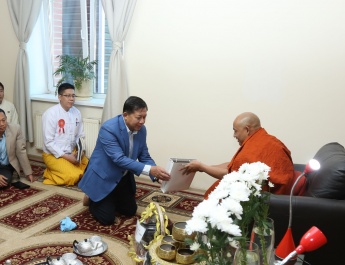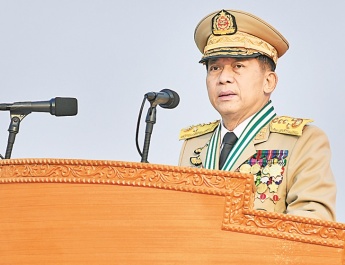Nay Pyi Taw June 29
Growing the trees aims to have good climatic condition, create shade and earn income from planting perennial crops and trees if necessary. Time, money and manpower are spent on growing trees. It is found that not thriving of trees is based on incorrectness of cultivation methods, short nurturing period of saplings and weakness of nurturing them. Hence, it needs to plant trees in a systematic manner, said Commander-in-Chief of Defence Services Senior General Min Aung Hlaing at the first monsoon treegrowing ceremony for 2018 of the Office of the Commander-in-Chief (Army) near Yezin Dam in Zeyathiri Township, here, this morning.
Also present at the ceremony together with the Senior General were his wife Daw Kyu Kyu Hla, Deputy Commander-in-Chief of Defence Services Commander-in- Chief (Army) Vice-Senior General Soe Win and wife Daw Than Than Nwe, the Union Minister for Home Affairs, the Union Minister for Defence, the Union Minister for Border Affairs and wife, the Chief of the General Staff (Army, Navy and Air) and wife, the Commander- in-Chief (Navy) and wife, the Commander-in-Chief (Air) and wife, senior military officers from the Office of the Commander-in- Chief and their wives, the commander of Nay Pyi Taw Command and wife, senior military officer trainees of the National Defence College, officers and families of offices and departments from the Office of the Commander-in-Chief (Army).
On the occasion, the Senior General said the Office of the Commander-in-Chief (Army) has been growing trees for seven years from 2011 to date. It was found some trees did not thrive. The whole Tatmadaw planted more than 10.05 million trees on more than 50,000 acres of land during the seven years period. As it was found that over seven million trees among them are thriving, it needs to cultivate the trees systematically.As a saying that weather depends on forest, efforts were made for greening the Anya region. As such, favourable weather covers the Anya region for having achievement in cultivation.
The Senior General continued to say that some people noted climate change causes heavy rains and changes of temperature in various regions of the world as well as in Myanmar, and such event depends on deforestation, hence the Tatmadaw grows trees. In so doing, it needs to cultivate trees with goodwill to have success for thriving of trees. In Myanmar, as there are many low-income people. Many people use firewood for cooking because of deficiency of electricity based on various reasons. Moreover, various kinds of wood still need to construct buildings and make furniture. Therefore, the Senior General stressed the need to grow valuable trees, firewood plants and shade trees in the assigned areas of respective military units and stations while systematically using electricity, firewood and charcoal as much as they can. The Senior General urged all to carry out their tasks with goodwill to contribute to fulfill the needs of the nation on one hand.
As part of leading the move, the Senior General and wife grew a valuable Mahogany tree. Next, the Vice-Senior General and wife, the Union ministers and wives, senior military officers from the Office of the Commander-in-Chief and their wives, officers, other ranks and families cultivated saplings at the designated places. The Senior General and party viewed participation of officers, other ranks and families in collectively growing trees.
At today’s first monsoon tree-growing ceremony for 2018 of the Office of the Commander-in-Chief (Army), they all collectively grew 500 valuable ironwood plants, 2,000 Mahogany plants and 2,880 gum-kino plants, totalling 5,380. With the aim of conserving natural environment and ecosystem around Yezin Dam, the Office of the Commanderin- Chief (Army) planted valuable plants, perennial crops and shade trees totalling 121,830 from
2011 to 2018.
Likewise, respective military commands held the first monsoon tree-growing ceremony for 2018 with participation of officers, other ranks and families. In so doing, Nay Pyi Taw Command grew 38,905 plants, Northern Command 22,544 plants, North-East Command 12,007 plants, Eastern Command 30,526 plants, Central East Command 11,350 plants, Triangle Region Command 34,590 plants, South-East Command 47,265 plants, Coastal Region Command 18,140 plants, Yangon Command 23,756 plants, South-West Command 22,189 plants, Western Command 34,454 plants, North-West Command 27,702 plants, Central Command 74,695 plants and Southern Command 35,537 plants, totalling 433,660.


